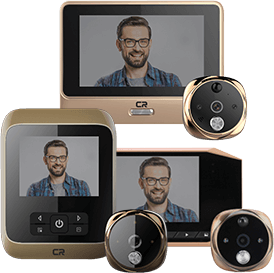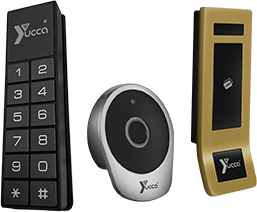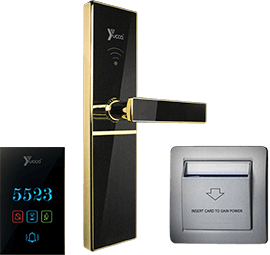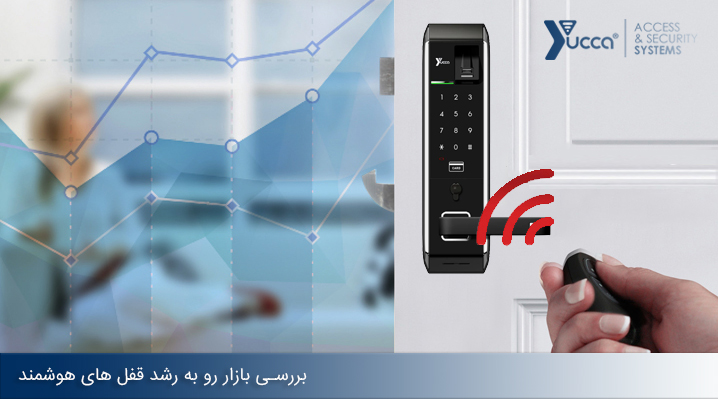What’s trending in the world of smart door locks? A new study identifies consumer demands for 2016 and beyond. A co-published report from IFSECGlobal and ASSA ABLOY reveals answers to key questions about the growing market for smart locks. What do consumers think a digital door lock should do? How do they want to access their new ‘smart’ front door? And what do they really think about relying on digital rather than mechanical security for the most important door in their homes?
Consumers understand that a smart home starts with a smart front door lock. “In this survey we polled hundreds of would-be adopters of this rapidly maturing technology from all over Europe, the Middle East and Africa” explains Adam Bannister, chief editor of IFSECGlobal.com. The result is a detailed assessment of the attributes consumers are coming to expect from a smart lock.
Regular homeowners are being won over by the advantages that wireless digital door locks bring for smart-home security
[fusion_builder_container hundred_percent=”yes” overflow=”visible”][fusion_builder_row][fusion_builder_column type=”1_1″ background_position=”left top” background_color=”” border_size=”” border_color=”” border_style=”solid” spacing=”yes” background_image=”” background_repeat=”no-repeat” padding=”” margin_top=”0px” margin_bottom=”0px” class=”” id=”” animation_type=”” animation_speed=”0.3″ animation_direction=”left” hide_on_mobile=”no” center_content=”no” min_height=”none”]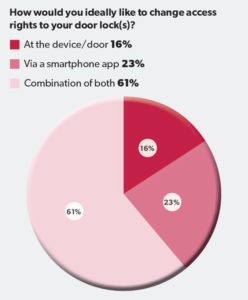
The report covers multiple aspects of this growing market, beginning with a fundamental question: what should a digital door lock do? And how do consumers want to control the new smart lock on their front door? The report details the functionality that potential consumers believe a lock and its paired smartphone app should have. “We already lead the way in providing digital access control to commercial companies with security-sensitive premises,” explains Omer Sagi, Smart door locks Manager at ASSA ABLOY EMEA. “Regular homeowners, too, are being won over by the advantages that wireless digital door locks bring for smart-home security.”
[/fusion_builder_column][fusion_builder_column type=”1_1″ background_position=”left top” background_color=”” border_size=”” border_color=”” border_style=”solid” spacing=”yes” background_image=”” background_repeat=”no-repeat” padding=”” margin_top=”0px” margin_bottom=”0px” class=”” id=”” animation_type=”” animation_speed=”0.3″ animation_direction=”left” hide_on_mobile=”no” center_content=”no” min_height=”none”]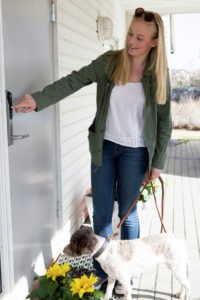
The report compares digital and mechanical security, examining potential adopter concerns and hopes for new smart-home technologies. Also it examines how much customers would be willing to pay for the increased functionality of a digital front door lock. Where do they want to buy such a lock? And what worries potential buyers about the installation and operation of a smart door locks ?
Omer Sagi adds: “Potential adopters are sophisticated; they have strong opinions about what they want from these products. We are delighted to be able to share some of our growing knowledge base with others in the sector. Our Yale Keyfree and Keyless Connected products, as well as the ENTR™ digital lock, distributed worldwide under brands including Mul-T-Lock, Vachette, TESA, KESO, NEMEF and Yale, already make up the largest range of connected security locks for smart homes on the market.”
This report is packed with data, and includes up-to-date qualitative insights reported by survey respondents, editorial staff at IFSECGlobal.com, and experts at ASSA ABLOY — the global leader in door opening solutions.
About ASSA ABLOY
ASSA ABLOY is the global leader in door opening solutions, dedicated to satisfying end-user needs for security, safety and convenience. Since its formation in 1994, ASSA ABLOY has grown from a regional company into an international group with about 46,000 employees and operations in more than 70 countries. In the fast-growing electromechanical security segment, the Group has a leading position in areas such as access control, identification technology, entrance automation and hotel security.
![]() [/fusion_builder_column][/fusion_builder_row][/fusion_builder_container]
[/fusion_builder_column][/fusion_builder_row][/fusion_builder_container]



